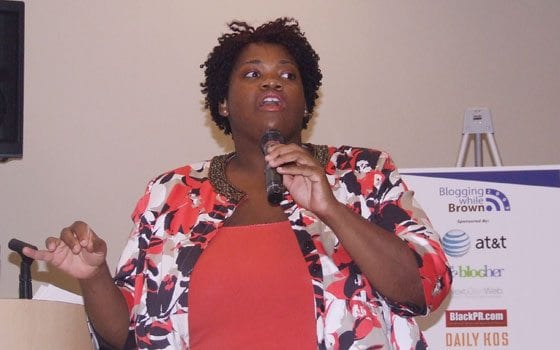
CHICAGO — Billed as perhaps the largest gathering of African American bloggers and Web users since the election of Barack Obama, last weekend’s second annual Blogging While Brown conference showcased enthusiasm for the potential of social media tools to spur change, bolster entrepreneurship and give unique voices an opportunity to be heard.
One theme that ran through the two-day conference was the hope of many attendees that more members of the black community will embrace the Web in campaigns about important issues.
Gina McCauley, who writes the blog What About Our Daughters (http://www.whataboutourdaugh ters.com), founded Blogging While Brown last year to build the network of bloggers of color and help them stay at the forefront of the new online frontier.
“There is so much to learn about the Web because it is changing so fast,” McCauley said. “There is so much potential on the Internet that the black community can take advantage of.”
Nearly 100 bloggers came from around the country to attend Blogging While Brown. While the content of their sites ranged from black women’s beauty tips to the latest gossip on black celebrities, many expressed interest in using social media for political engagement.
The use of the popular microblogging tool Twitter to disseminate information about the ongoing protests and unrest following last week’s contested presidential election in Iran have caused many observers to wonder how the technology could impact the way African Americans handle online social movements — as well as the role it could have played in past efforts.
Led by the Web-based activist group Color of Change (http://www.colorofchange.org), the online organizing and fundraising in support of the “Jena Six” — a group of six black teenagers accused of attacking a white teenager following a number of racially-motivated events in the town of Jena, La. — is largely considered the most successful Internet campaign among African Americans. However, some Blogging While Brown attendees wondered if the civil rights movement, the Rwandan genocide and the start of violence in Darfur would have transpired differently if today’s communications tools were available and widely used at the time of those events.
“What if black bloggers protested the Bush administration after [Hurricane] Katrina, like the Iranian protesters are doing now with their government?” asked one attendee. “We can learn a lot from the Iranians.”
While there’s room for growth, the black blogosphere has made significant strides. Cheryl Contee, a social media strategist and blogger at Jack and Jill Politics (http://www.jackandjillpolitics.com), said that the online activism of the black blogosphere helped propel Obama to the Oval Office.
More and more, the impact of black blogs is being noticed by those in power. Contee and her fellow Jack and Jill blogger Baratunde Thurston were credentialed to cover the 2008 Democratic National Convention in Denver, as well as the Inauguration Day activities earlier this year.
The popularity of the blog has made Thurston and Contee sought-after personalities. Contee recalled being invited to the G20 summit in London last March, where she mingled with world leaders and celebrities — including musician Bob Geldof, organizer of the famed benefit concert Live Aid, who said he was a fan of her work.
“Our blogs are read all over the world,” Contee told attendees. “You would be amazed by who is reading you.”
There was also discussion at the conference on how the black blogosphere will hold Obama and other black politicians accountable on domestic and international issues, such as education, the war on terror, environmental justice, drug and criminal reform, and still-rising unemployment.
While a variety of concerns were debated, many suggested that the next digital battle might focus on ensuring Internet accessibility to all.
According to Megan Tady of the media reform group Free Press, only 40 percent of Americans have broadband Internet access. Statistics compiled by market research analysis firm eMarketer show that 55 percent of African Americans are online. Mobile technology is a widely used tool in this demographic, and text messaging was used by Katrina survivors after the storm.
The conference also touched on major upheaval in the world of professional journalism caused by the online explosion. Veteran journalist and blogger Monroe Anderson said he was first exposed to the Internet when he was still a columnist for the Chicago Sun-Times. Now a contributing columnist at http://www.ebonyjet.com, the daily online magazine from the publishers of Ebony and Jet, Anderson said he is excited about to potential uses of social media by journalists.
“Journalists usually write the first draft of history, and the Internet presents more opportunities to tell stories,” he said.
However, many conference attendees criticized news outlets that have been slow to embrace social media — especially the black press.
Eric Easter, chief of digital strategy for the Johnson Publishing Company, which publishes Ebony and Jet magazines and operates http://www.ebonyjet.com, received heavy criticism from some attendees for what they say are a lack of relevant topics and social media engagement on the site. Easter said the Web site is still a work-in-progress, adding that in producing both Web and print content for the two venerable publications, the changing financial landscape in the media has to be taken into consideration.
“I think there is still room for print, but the business model has changed,” he said. “Newspapers and magazines have to think of a new way to attract readers.”
The project may have a long road ahead. When Contee asked the audience how many of them read the Ebony/Jet Web site, no one raised their hands.
As the debate over how old media outlets can stay relevant continues, leaders of color in new media keep building their community and taking advantage of the moment — one blog post, tweet and YouTube clip at a time.
“It’s important that black bloggers work together,” Contee said. “There really is power in numbers and diversity.”






